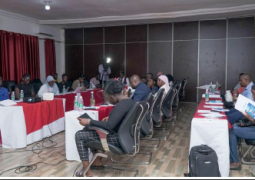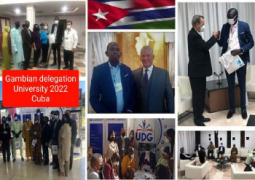
World Diabetes Day is the primary global awareness campaign focusing on diabetes mellitus and is held on 14 November each year. Each WDD focuses on a theme related to diabetes. This year’s theme in The Gambia is “Access to diabetes care.”
There are two types of diabetes namely Type 1 Diabetes (T1D) and Type 2 Diabetes (T2D). T1D is not preventable but can be managed with insulin injections, while T2D is largely preventable and treatable non- communicable disease that is rapidly increasing in numbers worldwide.
According to The Gambia’s 2018 NCDs national profile, NCDs (including diabetes) account for 34% of all deaths, an increase from the 32% reported in 2014. The World Health Organization (WHO) predicts that about 4% of The Gambian population could be diabetic by 2030, underscoring the importance of strengthening awareness of NCDs, especially diabetes.
Addressing the gathering, Ousman Nyang, executive member for Gambia Diabetes Association commended the German delegation for attending this year’s WDD in The Gambia.
“This celebration will raise awareness and ensure people manage their diabetes well.” he said.
Nyang said diabetes can destroy the human body and eventually cause death. However, he urged all to support diabetes patients so as to help manage the disease.
He, on behalf of the association, commended all those who contributed to the smooth implementation of the commemoration, while suggesting the need for more sensitisation in schools to ensure the younger generation have an understanding of the silent pandemic.
Momodou Gassama, health promotion specialist for World Health Organization Gambia Office described the day as significant, saying diabetes is a global concern as it affects everyone.
Gassama advised all most especially GDA and its partners to continue sensitizing the public in order to avert the prevalent diabetes. He noted that several diabetic patients in the developing countries had died due to minimal care.
“Some people have been battling with the disease for about forty years without any problem. But some people died of it because they do not respect diabetes management.”
Gassama thus stressed the need for series of sensitiszations to help enlighten the masses about the disease.
“We need to know our status to ensure we are able to manage ourselves,” he added.
Representing the Minister of Health, Alfred Gomez, a programme officer for Non-Communicable Disease at the Ministry, said his ministry is committed to supporting diabetic patients with the needed facilities and information to ensure their wellbeing.
“You are not alone in the fight of diabetes. We would continue supporting you in the fight,” he told diabetic patients.
Gomez urged all to continue their advocacy to help minimise risk of diabetes in the society.
Roland Shindler, founder of Gambia Diabetes Project in Germany, described diabetes as a silent pandemic.
To minimise the risk of diabetes, he called on the need for patients to promote physical exercise and ensure regular medical checkups.
He equally highlighted that authorities need to formulate better policies as well initiate programmes that would ensure access to care for diabetic patients.
Braham Cham, artist cum diabetic activist called on all protect diabetic patients and people not discriminate against them in the society.




